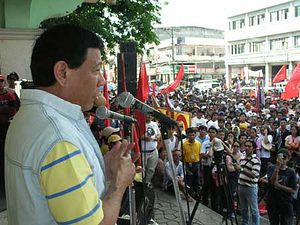The Philippines’ Department of Justice (DOJ) has petitioned a Manila court to declare the Communist Party (CPP) and its armed wing, the New People’s Army (NPA), as terrorist groups. Though the move is far from surprising, it is nonetheless troubling as it comes amid broader questions being raised about the government under President Rodrigo Duterte.
The petition was filed two months after Duterte terminated the peace process with communists. The government has also listed around 600 persons who are alleged to be leaders of the CPP and NPA.
The petition reiterated Duterte’s earlier proclamation declaring the CPP and NPA as terrorists for engaging in the criminal acts of “murder, kidnapping, arson and other activities for purpose of sowing terror and panic.” The CPP and NPA are accused of being “organized for the purpose of engaging in terrorism.”
Even though the petition is still pending in the court, it has nonetheless dimmed the chances of restarting the peace process which was initially given a boost when Duterte came to power in 2016. Aside from describing himself as a socialist at the outset, Duterte maintained friendly ties with the CPP and NPA when he was mayor of Davao City for two decades.
But the collapse of the peace talks last year and Duterte’s order to wage an all-out war against the CPP and NPA led to intense clashes between government troops and rebels in the past several months, especially in Mindanao in the country’s south.
Naming the CPP and NPA as terrorists was already a subject of a presidential proclamation. But filing a court petition proscribing 600 persons as potential terrorists because of their alleged links to the CPP and NPA has never been done by previous governments. Earlier this year, Duterte had warned that he will order a massive crackdown on rebellion by arresting communists belonging to the alleged legal fronts of the CPP.
The terror listing could be intended to demonstrate the government’s commitment to fight terrorism and justify the extended martial law declaration in Mindanao. But curiously, it has never filed a similar petition against extremist groups whose terror activities forced Duterte to declare martial law in 2017 in the first place.
The terror listing has therefore raised more questions than it has offered answers about the government’s ‘war on terror.’
For instance, though the list included the peace negotiators nominated by the CPP and publicly-known leaders of the NPA, it also included activists, leaders of people’s organizations, a former legislator, and even a UN special rapporteur on the rights of indigenous peoples. It is revealing too that several dead persons and disappeared activists were also added to the list.
That leads to a reasonable follow-up question: is the list a credible resource to understand local terrorism or is it a hodgepodge of names cobbled together and designed to intimidate Duterte’s critics?
For the colleagues of UN special rapporteur Victoria Tauli-Corpuz, who is mentioned in the list, the government petition is an attempt to silence those who are exposing and opposing the human rights abuses perpetrated by state forces.
“The accusation against her comes after the public comments made, jointly with other Special Rapporteurs, in relation to the militarization, attacks and killings of indigenous Lumad (indigenous) peoples by members of the armed forces in Mindanao; this accusation is considered as an act of retaliation for such comments,” said Michel Forst, the Special Rapporteur on the Situation of Human Rights Defenders, and Catalina Devandas Aguilar, chairperson of the Coordination Committee of the Special Procedures.
Corpuz herself described the inclusion of her name in the terror list as “baseless, malicious and irresponsible.”
But the DOJ is not backing down. “This list is a product of research and evidence supplied by police authorities and intelligence agencies. If they have evidence to the contrary, they should just answer the petition and the court will hear them,” said DOJ Secretary Vitaliano Aguirre II.
Human rights groups are worried that the terror list could lead to more cases of extrajudicial killings targeting activists, community leaders, and other dissenters. It could also create a chilling effect on society by discouraging the people to challenge the policies of the state.
The petition comes amid broader concerns about Duterte’s tenure. It was filed at a time when the ruling party is aggressively pushing for constitutional reforms that would give more powers to the president, cancel the 2019 elections, adjust the term limits of elected officials, and allow foreign ownership of land and vital sectors of the domestic economy.
In other words, the terror listing of hundreds of activists and NGO leaders could be part of an insidious plot to subvert democracy, impose authoritarianism through constitutional reforms, and attack those who dare oppose the rule of Duterte and the ruling party.
Given all this, it would seem wise for Duterte and the DOJ to reconsider this latest legal maneuver to undermine the CPP and NPA. Instead, they should seriously study the suggestion of their allies in both houses of Congress who proposed the resumption of the peace process with the communists despite Duterte’s non-stop ranting against the Left and DOJ’s proscription petition versus hundreds of activists. That would be a move that would actually contribute to furthering the country’s peace and security.

































